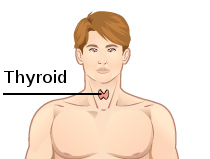Many types of autoimmune diseases affect millions of Americans yearly. Rheumatoid arthritis is one such autoimmune disorder you are probably familiar with, and then there are less common diseases such as Hashimoto’s Disease that you might have never heard of.
Many people have the notion of Hashimoto’s Disease being another term for hypothyroidism. However, this belief is false. Hashimoto’s Disease is actually one of the leading causes of hypothyroidism and is therefore not the same.
Hashimoto’s Disease may not be a well-known medical condition, which is why there are so many misconceptions about it. This article aims to shed some light on the condition to give you a better idea.
3 Remarkable Facts About Hashimoto’s Disease You May Not Know
Hashimoto’s Disease affects over 14 million Americans. However, there is much about it that many people are not aware of. Here are three surprising facts about Hashimoto’s Disease that you may not have heard.
1 – It Can Cause the Thyroid to Both Grow and Shrink
As mentioned earlier, Hashimoto’s Disease may cause hypothyroidism, which refers to an underactive thyroid. However, many are unaware that Hashimoto’s Disease can also cause hyperthyroidism (which is the opposite of hypothyroidism).

For many people, the first symptom of Hashimoto’s Disease is an enlarged thyroid. This is commonly referred to as goitre. As the condition progresses and continues to attack the immune system, the thyroid will continue to grow. Although the growth will not cause any pain, it may make swallowing difficult. At some point, the thyroid will become nonfunctional. It will atrophy and then go away over time.
2 – Hypothyroidism Caused by Hashimoto’s Disease May Be Fatal
The common symptoms of hypothyroidism are usually fatigue, weight gain, slow heart rate, difficulty concentrating, joint or muscle pain, sensitivity to cold weather, and menstrual problems. These symptoms are seemingly all over the place. The reason for this is because the thyroid is vital to a person’s normal metabolism and growth.
In many cases, hypothyroidism may cause a person to feel extremely ill. Seeking treatment for hypothyroidism is crucial, as this gland affects many vital body systems and organs. If hypothyroidism from Hashimoto’s Disease is left untreated, it can sometimes result in heart failure, seizures, coma, and even death.
3 – There Is a Link Between Artificial Sweeteners and Hashimoto’s Disease

There is some evidence that supports that artificial sweeteners may be a trigger for Hashimoto’s Disease hypothyroidism. A study has shown that thyroid levels may be triggered to get lower as a result of using artificial sweeteners. There has also been evidence in related studies that shows that people with Hashimoto’s Disease thyroiditis were cured after eliminating these sweeteners from their diets.
Conclusion
If you think you may have Hashimoto’s Disease, it is important to get a proper diagnosis. Once you get diagnosed, it will be easier for you to seek help and treatment for the medical condition. Making the proper lifestyle changes will also be more manageable. Let these obscure facts about Hashimoto’s Disease help you understand the condition better and what you can do about it.
There are many side-effects that come with Hashimoto’s Disease. Finding a support method that will improve a patient’s overall wellness is crucial to help them attain the highest quality of life possible. If you or a loved one needs Hashimoto’s Disease treatment, you can visit Health Optimizing Langley. We have great programs that help support your healing and recovery.



